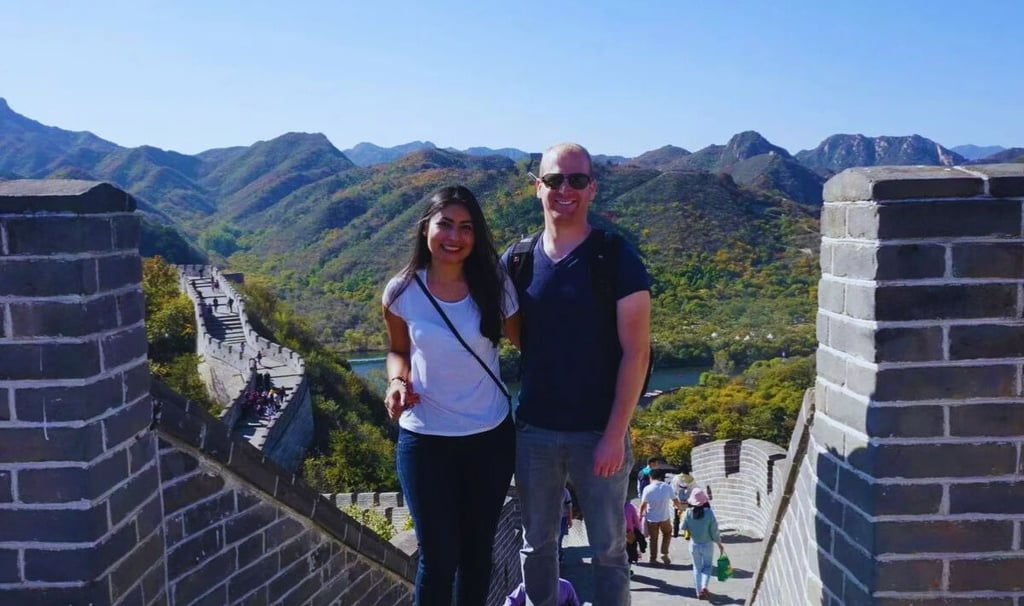Interview with Diana V., expat spouse in Beijing
" Thank you, Julie. Well, when my husband got the offer, I knew that I would stay with him. I mean, I had a great job offer in Germany, but I mean, we are married, you know, so we belong together. So, I knew that I would fully support his decisions. I don’t care if that will be in Germany or in China. That was the reason why I stayed in Germany, too. I’m from Colombia, originally, and I stayed in Germany because of him. I had stayed five years in Germany, and it was not easy to say okay, we are going to China now. I finished my bachelor’s degree online two months ago."
INTERVIEWS
Julie Marx
7/27/20219 min read


JM: Hi, Diana, I am really happy to have you here for our little interview series about China expat spouses, thanks for agreeing to talk to me. I was wondering whether you could start by telling our readers how you came to be an expat spouse in China. What brought you here?
DV: Thank you, Julie. Well, when my husband got the offer, I knew that I would stay with him. I mean, I had a great job offer in Germany, but I mean, we are married, you know, so we belong together. So, I knew that I would fully support his decisions. I don’t care if that will be in Germany or in China. That was the reason why I stayed in Germany, too. I’m from Colombia, originally, and I stayed in Germany because of him. I had stayed five years in Germany, and it was not easy to say okay, we are going to China now. I finished my bachelor’s degree online two months ago.
Everything was uncertain, too, because of Corona. I mean, I was not sure that everything was going to work. But I knew from the beginning that we would stay together. We trusted that the Chinese people would have everything under control when we got there. I was like, they are Chinese, they are going to have everything under control in a few months.
Everyone here is very disciplined, I can see that here on the streets. Everyone is wearing a mask. And nobody believes that they are the new doctors telling things that they know nothing about. They know that if the government and the doctors say that I have to do that, we will do it. And that’s the best way. So, I was not scared. I know that we belong together. And I am not saying this because he’s my husband, but he’s the most intelligent, beautiful man that you can meet.
JM: What a beautiful declaration. You only arrived in China fairly recently, right? Can you tell us where you are located right now and how you are settling in?
DV: Yes, we are in Beijing right now. And now I’m learning Chinese. I find it a little bit stressful because I just finished my bachelor’s two months ago. And in China, you need two years’ work experience after your bachelor’s to get a job.
While I have more than eight years’ work experience from Colombia, the US, and Germany, I only got my bachelor’s recently, so I am not eligible to work.
But I don’t care. I am just happy that we are here. We are alive. 2020 was really, really hard for everyone around the world. If you are not Jeff Bezos, of course.
So, I am learning Chinese, I’m trying to understand Chinese culture, to respect what they believe, how they think. The most important goal I have for myself is I want to improve myself as a person, and I’m trying to increase the quality time for our marriage now.
Because learning Chinese means I am learning about the culture and the country. That way, if he’s working the whole time, I can at least learn how to order a beer and dumplings for him.
JM: That is definitely an important skill, being able to order beer and dumplings. And what are your plans? You are just starting out, so are you planning on traveling around China exploring different parts of the country? Where would you like to go?
DV: The next place we want to go is Harbin in January, to see the Ice and Snow Festival.
JM: That is an amazing destination. I recommend going to the Snow Festival during the day when the snow sculptures glitter like diamonds in the sun. And then to the Ice Festival in the evening, when the sculptures are lit up in all colors of the rainbow.
DV: Thank you so much for your tips. We’ve been thinking about going there, but we know it is still a little bit difficult because of the current situation with Corona. There are cases in other cities, so we don’t want to do anything wrong.
JM: And then you might have to go into quarantine when you come back. That won’t help anyone.
DV: No, no, no. I mean our quarantine [when entering the country] was perfect for me because I was doing my bachelor’s online in Germany. I was alone and I was learning. But if I think that I would have to do it again now, it would be terrible, because I don’t have much to do.
Also, we are doing some different things on the weekend here in Beijing, too. Like going to different museums, to different temples, and to try to talk with the locals. Because that’s the only way that you learn about the culture. We can look up different things on the internet, but you really have to keep in touch with the people here in China, to understand them.
JM: And what better place to explore than in the capital itself. How long are you staying? Three years?
DV: For two years.
JM: Okay. I don’t think you’ll be done with Beijing in two years. There are so many things to discover.
DV: I know. Everyone is like: “Oh, what a pity that you cannot travel around Asia right now.” But I don’t care. I have Beijing, I don’t need anything else.
JM: Do you like the food? It sounds like you are already an expert on dumplings. Which, living in the North of China, means you are basically all set.
Jokes aside, I guess the food is pretty good?
DV: The food is delicious! We didn’t know all that much about Chinese cooking culture, so it is all new. And in our two and a half months in Beijing so far, we haven’t been to an Italian or German restaurant even once. I love the different Chinese food.
I was talking to my husband and he said: “No, I don’t need a pizza. I don’t need something German to eat. I just want to see what they have here.”
My friends from Colombia and Germany keep asking: “Oh my gosh, do they sell dogs or cats on the street to eat?” And I’m like: “Boy, we are in Beijing. It’s a big city. That happens maybe in a little village far away, but not here.” People have the wrong ideas about China. They don’t do any research and do nothing against that ignorance. It is rather funny to see the comments people make, sometimes, when they don’t really know anything about the subject. Like: “Oh, you can use your cell phone? And there are stores that carry items you like?”
JM: What a lot of people don’t understand is that in many ways, China is so much more modern than anything they know in Europe. I mean, we were using QR codes to pay for things when Germans were like: “A what code now?” What I love about the Chinese is that they’re so open to trying new things, especially when it comes to technology. Yes, they’re really excited about the possibilities that technology brings.
You are still at the beginning of your stay. But you already mentioned that you want to use your time to learn about the culture and learn Chinese. What other things do you feel being an expat spouse in China is enabling you to do. What are the things you can do that you couldn’t do back in Germany or back in Colombia?
DV: Well, I think there are a lot of possibilities, and you have to learn to discover them and use them. Before coming here, it was tough for me. I’m 27 years old, and now have to wait to see if I maybe get a job offer or not. But I decided not to freak out about it. I can learn a new language, I can help my husband, I can do all the things that I could not do with my time in Germany because I was working six days per week there.
Not everyone needs to learn Chinese like me. I think it is the best way to learn about the culture, but it is also a way of proving to myself that I can accomplish things that are different.
I think as an expat spouse, you have to have a lot of passions. Because you need to figure out whether something is the right thing for you. And you need to be open and do your research beforehand.
For my husband and me, the culture shock was not bad, because we had traveled a lot in Asia previously. And it is funny that you mentioned the QR code for payment because I had the reverse experience when I first came to Germany. It was terrible for me that in Germany, most places would not let me pay by card, just cash. They would keep asking me: “But don’t you have cash with you?” And I didn’t have it. And of course, as a foreigner in Germany, I could not always order in English, and if I tried, they told me to go away.
I have had that experience of getting to a new country and having to learn the language and trying to fit in. And I was scared that it would be the same here and that my husband – who hasn’t had this experience previously – would react badly. But here in China, everyone is trying to help you. I don’t know what things are in Chinese yet, but they try to help me.
JM: I love those situations. Where everyone is standing around, trying to figure out what the foreigner wants and all are smiling and having fun. And in the end, you’re going to get something to eat. It might not have been what you ordered.
But you’ll make a new discovery.
DV: Yes. So, so funny. Since I am now learning Chinese, I try to order all the time in Chinese, and they will try to correct my pronunciation. And I love them because they’re trying to help and they stay there until you say the word right.
And my husband is very lucky because the Chinese people have a big love for all things German. If you say you are German, everything will go smoothly for you.
JM: Yes. They really admire German technology and German culture.
DV: Yes, that’s so funny. When we went to Tiananmen Square one time, they were checking passports. And as soon as they saw my husband, they asked him where he was from. And when I said 德国 [Germany in Mandarin] they immediately waved us through.
In Colombia, it is similar with people from the US. But I had never experienced this first-hand.
JM: It sounds like you are really embracing this experience and using this time for yourself. You are using your stay in China for self-development, which I think shows a very positive attitude.
If you had one thing to say to someone who was preparing to go to China as an expat spouse, what would your advice be?
DV: If they have fears, they should do research about the country. Find out what is okay and not okay to ask about, for instance. I have met some people asking very disrespectful questions. Yes, do research. I did the same when I moved from Colombia to Germany.
And know what you want to achieve in your life. Because not everyone has the same goals in life. Not everyone might want to take the time for themselves and learn the language. Not everyone wants to just be a mother while they are here. Not everyone might want to stay at home the whole day.
There are women who want to work here, but they cannot, for various reasons. And COVID is definitely not making things easier in that area. And if you see yourself as a businesswoman, but cannot work, you will be frustrated, and that is not good. Your husband needs your support, as he will be working all day. That is difficult, too. To work in this other culture the whole day. So, you have to be prepared to not say all the time: “I need, I need…” Think about what you bring into the situation, too.
So, I know some women who sent their husbands alone to China. They said they were not ready to go to China, and I think that’s pretty good, too. It will be better not to stay together rather than coming here and the couple fighting all the time. In that case, it is better for the wife to stay back. You don’t have to follow the path of your husband. But if you want to, you have to know that you have to give him your full support. You cannot complain about your life here, because he also has stress to deal with.
JM: So, know your passions and your goals. And create a life for yourself so that you are strong in and of yourself and can be good support for the person your accompany?
DV: Exactly.
JM: That is beautiful advice, thank you. And thank you for this interview today as well

My office
Ji’an Road 42-1, No. 2-3
Heping District Shenyang City Liaoning Province CHINA
Germany:
In der Zennwies 2, 66629 Freisen, Germany


Intercultural Experts


